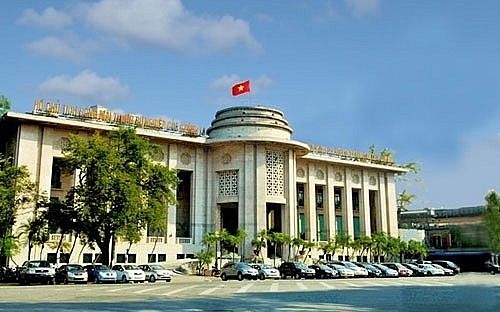INTERNATIONAL INVESTMENT
AND PORTAL
Numerous countries and businesses are limiting their financial relations with Russia, with its exclusion from the SWIFT international payment system triggering concerns about cross-border financial security which may adversely leave a scar on Vietnam’s banking sector.
 State Bank of Vietnam (SBV)
State Bank of Vietnam (SBV)
The State Bank of Vietnam (SBV) last week requested commercial banks operating in Vietnam to inform on the state of cooperation with Russian entities in the context of economic turmoil.
According to the statement, the commercial banking system is facing adverse impacts as a consequence of US and EU sanctions against Russia, particularly those that are currently associated with or directly cooperating alongside various Russian financial institutions.
The SBV has urged banks to promptly report on their cooperation with the Russian market, covering agency interactions, payment methods, financial transactions, contract projects, major challenges, and arising issues.
“Specifically, an in-depth analysis of how Russian sanctions may affect customers’ transactions, particularly the existing loans, should be provided as well,” the SBV highlighted. “Simultaneously, commercial banks should prepare their strategic plans to alleviate current and foreseeable obstacles in money transfer payment operations with Russian partners.”
Some major Vietnamese banks have been actively boosting their presence in the Russian market, including Vietnam-Russia Joint Venture Bank (VRB), VietinBank, and BIDV. In principle, banks can also communicate without SWIFT, for example, by direct contact via telephone or e-mail.
However, this is much more cumbersome, and therefore more time-consuming and costly. The ban thus severely restricts Russian banks in international transactions, and also disrupts the transactions from Vietnamese banks to their Russian counterparts.
VRB had been granted a licence to participate in a distinct payment channel to Russia. The bank provides direct bilateral money transfer services between two nations. However, international credit rating agency Moody’s last week withdrew ratings of VRB in some major perspectives, such as long-term and short-term bank deposits and long-term counterparty risk, among others.
Seven Russian banks were banned from the SWIFT global financial messaging system last week. The moves are likely to leave an adverse effect on Russian investment projects, including those associated with Vietnam in oil, gas, electricity, and others.
VNDIRECT stated that Russia is the third-largest coal export market to Vietnam at a figure of around $527 million, primarily in thermal coal.
“We believe that coal-fired power plants in Vietnam will face the risk of supply shortages when it is difficult to switch suppliers in the short term. However, we expect a minimal effect as Vietnam consumes only about 12 per cent of exported coal annually,” the brokerage said.
Russian-invested power projects including thermal plants and renewable energy ventures may be delayed, VNDIRECT predicted. The Long Phu 1 thermal power plant and Quang Tri combined cycle power plant, with a total capacity of 1,200MW and 340MW respectively, are already approximately two years behind schedule.
Nguyen Dinh Tung, CEO of OCB said, “Excluding Russia from the SWIFT system would be very tough, although there will be workarounds. Notwithstanding, Russia’s technological advancement may enable their banks to quickly locate alternative options.”
Elsewhere, Visa and Mastercard have barred financial institutions with associated Russian ties from their networks in reaction to sanctions imposed on the country.
Duong Le-Partner, Indochine Counsel

In terms of legal perspective, the ban of Russia from SWIFT may be deemed as a force majeure event. Therefore, payments/transactions between Vietnamese and Russian parties may be delayed.
For this situation, the related parties shall have to follow the terms and conditions of the contracts, notify other parties of the effect of force majeure, and notify the termination of such contracts and for the consequences of termination, if any.
This sanction seriously affects import and export as well as the tourist industry. As a result, the parties involved may choose an alternative payment method. However, if head offices of these providers are in the United States, for example, this service may be stopped anytime due to the conflict of interest.
By Celine Luu



















